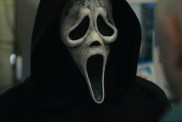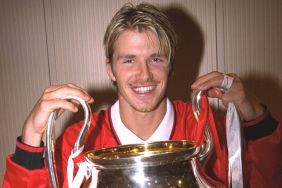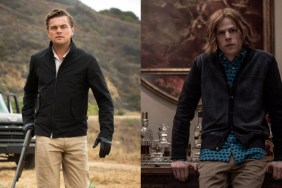It might seem to some like comedian Demetri Martin came from out of nowhere, especially for those who first become aware of him as the star of Ang Lee’s latest movie Taking Woodstock. In fact, Martin has been paying his dues for years as a comedy writer for the likes of “Late Night with Conan O’Brien” and doing the stand-up circuit before scoring his own Comedy Central show “Important Things with Demetri Martin.”
Lee’s movie, written by his long-time collaborator (and head of Focus Features) James Schamus, takes place behind the scenes of the legendary Woodstock Music Festival of 1969, and Martin plays Elliot Tiber, a young Jewish man on the local community zoning board for the small town of Bethel, New York, contacted by concert promoter Michael Lang to help him prepare for “three days of peace, love and music.” Elliot’s parents (played by Imelda Staunton and Henry Goodman) are local hotel owners who are completely against the festival until they realize they can charge exorbitant prices for their lodging. The question is whether Elliot can fulfill all his obligations to help everything run smoothly in order to get to the actual festival himself.
ComingSoon.net attended the recent New York junket for the movie and had a fun time at this roundtable interview with the young comic.
ComingSoon.net: Are we your last roundtable interview?
Demetri Martin: Yes, you’re my last roundtable.
CS: Is there anything you have not yet been asked that you wish to be asked?
Martin: Well, your first question… nobody asked that. (laughter) But that was an easy answer, so I liked it.
CS: Were there any events from Elliot Tiber’s book that you wish had been in the movie for your character?
Martin: I haven’t been asked that question either. When I read the book, at first I was worried ’cause I was like “I don’t know if they’ve got the right guy here” because there’s some pretty graphic stuff there. Elliot Tiber kind of alternates chapters where he talks about Woodstock and his family and then being gay and closeted and discovering that he was gay and some of the stuff he did in New York.
CS: He was into some funky things.
Martin: Yeah, like the leather and that kind of stuff, so I was like, “Wow, this would be really challenging.” I just haven’t acted at all really, just little things here and there, so it’s weird like in retrospect, it might have been cool to see how we might have pulled off some of that stuff, but at the same time, I guess I’m kind of relieved that it wasn’t in there. I’m trying to think of other things in the book, maybe specifically about the concert. If anything, I wish there were more of New York City because he does spend a fair amount of time in New York. I could see how that could be prohibitively expensive, but to shoot scenes about New York in the ’60s, that would have been really cool. I think when you learn about Stonewall and some of that stuff, it’s pretty awesome. I’ve been in New York for 13 years, and New York’s great because geographically, it can’t change that much. It’s this island, Manhattan, so it’s cool to think of those specific streets having much different content on them.
CS: I’m sure you’ve been asked this question before before but I’ll ask again. You haven’t done that much acting before, just on Comedy Central and “The Daily Show,” so how did you end up starring as the lead in an Ang Lee movie? It’s something any actor would want to do, I’m sure.
Martin: Yeah, absolutely. It’s definitely a weird lucky story for me where James Schamus’ daughter showed him a clip of me on YouTube one night at their dinner table at their house I guess, and James was like, “Oh, that’s interesting.” That led to a general meeting with James and then nine months later, I got called back into Focus to meet with James and Ang, and that’s when they had this project brewing.
CS: Did you have a physical resemblance to the actual Elliot Tiber?
Martin: Not really, no. That’s why I thought I’d find a picture of the guy and go, “Oh.” I think they were just looking for a vibe maybe, like a certain demeanor that they thought they could work with. The second meeting led to an audition a week after that where I did four scenes for Ang and he videotaped me, and then a couple days later, they said “Okay, you got the part.” I was definitely surprised, because even after the audition I thought, “I didn’t do to well on that.”
CS: What scenes did you do?
Martin: I did the whole movie… it was a very long audition. (Laughter) He’s intense. He wants to know for sure. (laughter) Actually, I did one scene that’s not in the movie anymore that took place in a gay bar that was one of the New York scenes, so there was another New York scene that wasn’t in there, so I wish we had that and another one. I did this scene where I’m in a bar with my friend Steven who is the guy on the phone who says, “We’re going to San Francisco, you should come.” I did that scene. I did a scene where I talked to my Mom about the money, and oh, man… I can’t remember the other ones. There was one that was pretty hard. I think I did the press conference, too, actually. That was funny, I totally forgot about this but the press conference scene where I get high and then I talk to the press, they sent me an Email with the scenes I had to audition with the night before my audition, my sides, it was PDF. Well, something happened and there were pages missing at the end, so the last scene was just half a paragraph and there was nothing else, so I wondered why they wanted me to do that. It was so short, and what it was was the press conference, which unlucky for me, the break was at the beginning of the press conference. They said, “Let’s do the press conference” and Ang’s there so I turn to my script and I’m like, “Here we go.” So they go, “Action!” and I do the three lines and they’re all still looking at me, so I just start improvising off all this stuff (laughter) and then they go, “Cut,” and it’s really awkward in the room and they go, “Okay, why don’t we try doing what’s on he page.” I’m like, “This is all I have,” and they’re like, “Oh, oh! Okay, here.” Then of course I was really not prepared for that, so that’s why I thought, “I’m not going to get this.” I got to audition for Woody Allen years ago, auditioned for like the lead of “Melinda and Melinda” and it was kind of a similar thing where Woody had seen my stand-up on Letterman and they called me in to audition for this thing. I really had no experience and I didn’t get that part, but I remember leaving thinking, “That’s so cool. Just from doing stand-up, I got to meet Woody Allen and I got to audition for him.” So it was kind of a similar thing where it’s like from following my dreams with stand-up, I’m getting to meet Ang Lee. I can’t lose at this point. At that point, if I don’t get the part, it’s like, “Well, I didn’t get the part but I still got to meet another cool director.”
CS: Did he work with you while you were auditioning?
Martin: Yeah, he did. He had a video camera there. He was standing next to the cameras holding it, so I did the scene one time through, this other scene, and then he started saying direction. He told me, “I might say things and I just want to see if you can adjust.” So he’d say stuff like, “Could you be more sad?” or “slower,” stuff like that so I’d have to adjust while he was saying it.
CS: What was it like having these two British stage actors (Imelda Staunton and Henry Goodman) playing these Jewish parents? Was that very surreal to see them play those characters?
Martin: Yeah, it was crazy because we did a camera test pretty early on, and they just had a grey backdrop, and it was when they were looking at us in our costumes and stuff, and I’d met Henry and Imelda and they were just delightful, very warm, older stage actors, and they were giving me advice and they seemed very cultured and really sweet. Then all of a sudden, they show up and she’s got the rollers in her hair and these fake big boobs and all this stuff they put on her, and they’re standing in front of a grey backdrop and they were so in character, they looked like they’d come out of a time machine, because there were no physical indicators, just greyness and them and the cameras on them. It was all of us in modern day (clothes) looking at them and Imelda was kind of unbelievable, because she was really funny and playful and would tell jokes but she’s still in the costume and everything and Ang would be “Okay, rolling” and sudden, she’s in character and does it, and then “Cut” and she’s back to just herself.
CS: So they were in and out of character the whole time?
Martin: Yeah, yeah, especially Imelda. Henry would do that, too, but he was a little quieter and he would go off and think about stuff but Imelda was (snapping fingers) in and out. It was like what a skill. You hear stories about guys who are really method and they have to go punch a dog or something. (laughter)
CS: Where do you fit into that role as an actor?
Martin: I don’t know. I always thought that if I ever get to be in a movie, it would be because I wrote it and it would be something that I was right for, because I could write it and control it. Even if that takes a lot longer, hopefully I would find my way up to that. I still really hope I get to do that, so that was kind of like my goal. Getting to do parts in other people’s movies is a real privilege, and I think I do understand how lucky that is. I was supposed to be in this movie “Moneyball” and it might still get made, and we were almost shooting. We were I think two days before principal photography and the movie got shut down. It was like Steven Soderbergh and Brad Pitt, so I was thinking that if their things get shut down, that is truly a miracle when a movie gets made and actually distributed and in theaters. If it’s good on top of that, then it’s like a quadruple miracle. The nice thing about stand-up is that I can control it a little bit more, just as long that I write jokes every day, I can at least control my body of work to some degree. The quality, you just never know, but I am the one making it, whereas with this, I’m a guest. They’re really inviting me into something.
CS: How do you write jokes every day?
Martin: I carry a little notebook usually and I just write down ideas. I draw a lot. Sometimes, if I have no other idea, I just draw a shape and then see what it reminds me of, and if that reminds me of a situation then maybe I get a joke out of it or maybe it’s just a funny drawing in the end. I read the dictionary sometimes, like if I’m on a plane. The best are foreign language dictionaries, because their English is clunky, it’s almost like poetry. Like the sample sentences in English are almost awkward and they make me think about English differently. It doesn’t feel like my native language. But those are the more mechanical ways. Usually, if I daydream, by looking at things, jokes will come to me, but I write a lot of jokes and a lot of them aren’t funny, but I learned that I have to write them down. To get to a good joke, I almost have to write ten sh*tty jokes and then I get rewarded with having a good one. I can’t think of ten sh*tty jokes and only write the ones I think are good, because it doesn’t work. I have to write things that I’m like, “I think this is cheesy” or “this is hacky” and then I get to a good one.
CS: While you were on the set, did you pitch any ideas to James or Ang to add some comical elements?
Martin: Yeah, I thought early on that I’d be able to do that and I kinda got the drift early that wasn’t his kind of thing. One time I pitched to Ang–this is probably a mistake–but there’s a part where one of the characters falls in the swamp and the birds fly out, and then he gives a line–like he has mud on his face and everything–and he’s walking up a hill and his line he gives looking back and then keeps walking up the hill. I said to Ang after one or two takes, I said, “I know this isn’t my place and forgive me if I’m overstepping here but if you wet his ass, you’ll probably get a joke, just because the last shot we’re seeing is him walking away and he just fell in the water but his butt’s dry. If you put a wet spot on his ass, it could be really funny visually.” Ang didn’t say anything and he walked away and then I heard him say (whispering) “Wet his ass.” (laughter) When I watched the movie, I swear the only thing I was looking for was if they kept it, but it’s not in there.
CS: Can you talk about the scene you did with Paul Dano in the van?
Martin: That was really cool. I had seen “There Will Be Blood” and I was like, “Man, Paul Dano, that guy can really hang.” That was a notoriously intense set from what I understand. I think Paul replaced a guy. They shot almost half the film or a bunch of scenes and the other actor was like, “I’m out, I can’t do this” so when I heard Paul Dano was in a scene, I was like “This guy, he’s got the chops for sure.” He was really cool, very mellow. The funny thing about that was he’s like, “Yeah, man, I’m really psyched to do this, I’m just here for a couple days but I thought, ‘Ang Lee, I gotta do it. I even stopped cutting my toe nails…'” (laughter ) So he had these crazy hippy toenails and then when we were in the van, Ang was like, “Yeah, explore each other’s bodies” and he was telling Paul to rub his leg on me and everything and all I could think about was these claws…” Do not touch my skin with those toenails.” (laughter)
CS: We heard that Elliot likes to talk about Nazis, so what were your conversations with him like?
Martin: Oh, yeah. The first time he came up on the set, and he saw me, like on the first day of shooting, and he goes, “I never wore a shirt like that.” I was like, “Oh, boy.” My girlfriend was visiting the set once and we were shooting this scene at this gay bar in New York at night and he was alone with her and her friends just telling them these crazy stories about the cops and she was like, “Hell of a guy you’re playing here!” (laughter) It was just a different story, I just took a slice of that story.
CS: So that was the scene that was shot but just not used?
Martin: Yeah, that scene was shot. We shot at The Eagle, it’s this famous bar where there’s a lot of leather and guys who have different studs and hats and stuff. There must have been about 200 or 250 guys, maybe regulars from the bar, but they had them in costume and everything. There were not many ladies in that vicinity. It was one of the most guy-intensive places I’ve been. It was really cool, it was really fun, and again that was one of the times where I was like, “I hope I’m just being authentic here. If I’m one of the only straight guys in this room, I can see how it would really piss off a bunch of people.” But people were really cool and it seemed like it went well, although it’s not in the movie, so maybe I blew it.
CS: How long have you worked as a comedy writer?
Martin: I worked at Conan for a year. I got hired in 2003 and I left a year later. I wanted that job so badly, and I loved the job. It’s such a great place to work but the thing about working there is you don’t know when you’re going home at night, so if you want to do stand-up at night, like you can’t do it. Some nights you stay until 11:30, so I kept having to cancel spots. It was this really hard decision in life where I got one of the things I really wanted and I was like, “This is crazy. I’m quitting Conan. Am I going to regret this?” So I quit so that I could focus on my stand-up.
CS: Did you go back and do stand-up on his show?
Martin: Yeah, yeah, and I think I’m going to do the show on the 14th of August, so…
CS: It’ll be interesting when you’re sitting on the couch of the guy you used to write for.
Martin: I know, I know, it’s weird.
CS: You don’t want to be funnier than him.
Martin: I don’t think I’ll have that problem, but one thing that was funny was that when I worked there–this was even more awkward?Entertainment Weekly did the “25 Funniest People in America” or something, it was in 2003 or 2004, and so it comes out, and I come to the office and people are like, “Congratulations,” and I’m like “What are you talking about?” so on that list, I was 21 and Conan was 16 and people were like, “Good thing you didn’t get ranked higher than Conan.” (laughter) I mean, Triumph (the Insult Dog) was like 7 or something. (laughter) So when I pitched stuff in writers’ meetings, and if it wasn’t funny, people would go, “21.” (laughter) Which is the worst thing ever to rank people. I don’t know why people do that, it’s crazy.
CS: As far as the screenplays you’ve been writing, do you have anything close to production?
Martin: I wrote a script called “Will” originally for DreamWorks, and now it’s at Paramount, so I’m doing a rewrite of that now, and I wrote a movie called “The Moon People,” a script with a friend, and that one’s at Sony, so both of those are being rewritten. I have a couple other ideas, but I have to do the TV show again. I’m writing the second season of the TV show now with some people, and I’m everything’s kind of overlapping so it’s really hard to get fully-immersed in one thing.
CS: Are you generally writing the screenplays for yourself to act in, and that’s the first thing.
Martin: Yeah, those ideas are pretty old. The one idea is about eleven years old and the other idea is say four years old, so that’s when I tried to write stuff to say, “I can be an actor if I’m the second guy in this movie because I think I can do this part well.” I think it’s a funny idea that merits being a whole story, but I’d play a part in it. I love doing stand-up but it would be nice to be able to do other things in a career so if I get the house and a family and that kind of stuff, it would be nice to be able to be someone who lives in one place, not that for movies you necessarily get to be in one place, but you figure that if you live near L.A., you probably work closer to where you live. You’re not like going to Detroit this weekend and then to Australia for a month or so.
CS: How come you don’t write the lead role for yourself, especially with Seth Rogen eventually getting leads when he wrote them for himself.
Martin: Yeah, I just don’t think I’m confident enough. “Great script… wait, you’re this guy?” I don’t think so, but now, hopefully I can kinda grow into some of that stuff. They’re kinda like two-handers or ensemble things where it would be cool to have the benefit. I remember telling someone, “Here’s the thing. Write a good script. Write a part you’re perfect for, and then write parts that big stars would love. Big stars get the movie financed. You ride the coattails and you’re in the movie.” (laughter) It’s that simple!
Ang Lee’s Taking Woodstock opens in New York and L.A. on Wednesday, August 26, and everywhere else nationwide on August 28.










